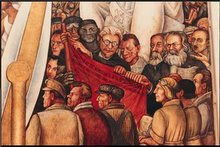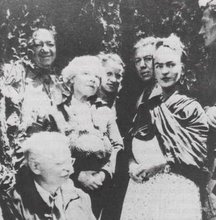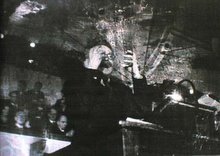20th Anniversary of being a Trotskyist.
On November 15th (a week this Thursday) I became a convinced ideological
Trotskyist but too young at 10 to join the movement. At 16 I joined the
4th International. Watching on the TV how the riot police treated Miners
who were just fighting to keep their jobs radicalised me and helped the
process of becoming a Socialist.
THEORY OF PERMANENT REVOLUTION
VERSUS STAGES THEORY WON ME
TO TROTSKYISM.
Before I left primary school I was reading books at the school library on
the Russian Revolution. In 1987 I became interested in Trotsky’s
theory of Permanent Revolution against the Mensheviks-Stalinists
theory of stages. This coincided although I did not know this
at the time with an internal struggle within the Socialist Action editorial
board between supporters of Permanent Revolution and those who rejected
that theory due to agreeing with Jack Barnes’s line. The Barnesites lost
that battle and set up their own organisation in February 1988/
What I learnt from Trotsky is that the Peasantry is middle class
which vacillates between Capitalists/Aristocrats and Labour. They follow
whichever class is the most decisive. Trotsky also rejected the two class
dictatorship which Barnes revived in how he formulated the Workers
and Farmers government. The two class dictatorship was the
Menshevik/Stalinist theory that the workers could rule with middle class
and Capitalist forces. This Menshevik/Stalinist theory was a revision of Marx’s
line on the unstable character of petty-bourgeois forces in how they
differentiate between Capital and labour. The essence of Trotsky’s
theory is that classical Bourgeois-Democratic tasks such as land reform
could only be carried out by revolutionary workers overthrowing Capitalism
because Bourgeois forces would block any major reform due to their
potential profits being threatened.
BEING THE MOST
CONSISTENT
IN ANALYSING CONTRADICTORY
EFFECTS OF 1989 EVENTS IN
EASTERN EUROPE.
Alongside Ernest Mandel I was one of the few Trotskyists to analyse the
contradictory character of 1989 Eastern European upheavals. The line
I agree with is that Trotskyists support all challenges to Bureaucratic rule
by workers and equally oppose moves to Capitalist restoration. There
was a dispute within the Socialist Action editorial board over how
to respond to these rebellions. Fourth International supporters argued a
line I agree with wherehas the editorial board majority adapted to
Stalinism by dismissing all the workers rebellions moving in the
direction of incipient Political Revolution as purely counter-revolutionary.
Again I was not aware of this dispute.
There are three qualifications I would make to my 1989 analysis,
I tended to be spontationist in seeing inevitable Political Revolution
without a revolutionary leadership. Due to this crisis of leadership
the struggle between workers; Bureaucrats; and Capitalists have been
protracted. Socialist Action was one extreme but Trotskyists should
have been more critical of those petty-bourgeois leaderships of the
1989 revolutions who went onto to link with elements of the
Bureaucratic Castes that became conciliatory to Imperialism. During
1989 I was proven wrong that Trotskyism would massively grow.
What I under-estimated was to the extent that the Liberal Bourgeoisie
within the Imperialist countries could get a new lease of life
ideologically.
The weakening of Stalinism in Eastern Europe and Russia has created
a whole series of hybrid; contradictory; and transitional phenomena.
There has been Capitalist economic inroads within these states but
they remain Workers’ States due to the predominance of non-Capitalist
ownership of key industries/sectors of those economies/industries.
Trotsky’s prediction of Stalinism imploding going in every direction
has been proven correct. Another aspect of Trotsky’s analysis is that
the main section of Russian Stalinism would resist going back
to Capitalism because of losing their privileges. This is because
restoring Capitalism would mean this because Capitalism would
only keep those Bureaucrats who were profitable.
There have been certain Stalinist formations set up on a chauvinist basis
as they see that is the best way of protecting the Bureaucrats power,
They have set up these parties in certain cases with right wing Bourgeois
forces. Unlike the Stalinphobes we see the Stalinists has predominantly
leading such parties but oppose them for being chauvinistic and
being in alliance with Bourgeois forces. This is another example
of Trotsky’s analysis that Stalinism by its counter-revolutionary
character lays the basis for its own overthrow by chauvinists to
their right. Trotskyists also recognise that these Stalinist and
Bourgeois forces in chauvinist alliances are ultimately irreconcilable
due to their different class basis. The upturn of world revolution
can help lay the basis for other Political Revolutions in these
countries to clear these degenerates out.
HIGHLIGHT NUMBER 2 DEMOLISHING
SEAN MATGANNA ON IRELAND
AT A 1995 DEBATE.
I joined the ISG in 1993. One of my best interventions outside
of a 2002 summary at a ISG aggregate was when I made a
5 minute contribution on Ireland at a 1995 debate on Ireland.
In that contribution I went briefly why Bourgeois Nationalists
could not defeat Imperialism in North of Ireland; why the
struggle to reunify Ireland was tied with the Permanent
Revolution; and ended up attacking Matgamma for reviving
Kautsky’s Ultra-Imperialism with him arguing a federal
Europe could liberate Ireland.
BEING INVOLVED WITH
A TENDENCY STRUGGLE
WITHIN THE ISG.
In April 1996 I was involved with other co-thinkers in establishing
Tendency E to oppose a majority which was arguing for de-facto
Strategic Entryism and to fight an element from a tendency we came out
Of (Tendency C) which was under Ultra-Left pressures. TE opposed
both currents for semi-rejecting Trotsky’s analysis of Bureaucracy
in Russia; and being sectarian in the Russian Communist Party’s
struggle against Yeltsin. For three months in the summer of 1996 I wrote a
74 page document (which Bob Whitehead edited and reduced to
37 pages by double pages) defending our tendency’s line on Russia.
The main thrust of that document was to attack “State Capitalist” theory
and British SWP’s method of politics.
WHY I LEFT THE ISG
IN 2002.
From 2000 layers of the ISG started crossing class lines with central
leaders supporting Imperialist UN occupation of East Timor. In 2002
there were further three qualitative developments in the ISG’s leadership
degeneration. They were calling for a vote to Chirac; dumping most
of the Workers’ States except Cuba; and liquidating a revolutionary
paper into Centrism,
Since I left in November 2002 the ISG has degenerated further with
them going into a Popular Front with Respect; Socialist Resistance in
statements suggesting they support Prosecution of Sheridan. Now
Socialist Resistance have supported Galloway organisationally against
Forces opposing his Popular Frontism. Their degeneration reminds me
What Cannon said that small degenerations grow into bigger
Degenerations.
PROSPECTS FOR
TROTSKYISM.
Revolutionary Marxism is growing among radical youth globally. This
is because of Capitalism’s and Stalinism’s crisis. Trotskyism has the
potential to grow and attract the best of the youth due to the correctness
of our ideas and being bold. There has a greater potential for Trotskyism
among these layers than the 1960s.
I am glad to be a Trotskyist for 20 years and bring some of my knowledge
and experiences in helping to forge a Trotskyist cadre.
Tuesday, 6 November 2007
Subscribe to:
Post Comments (Atom)



No comments:
Post a Comment